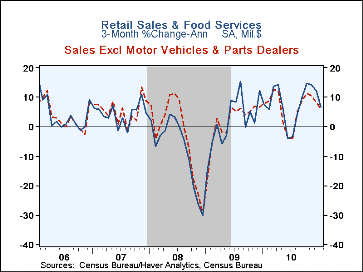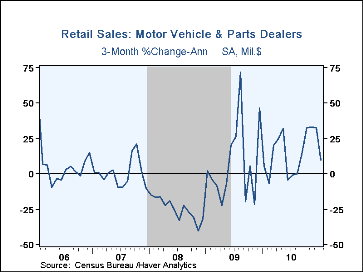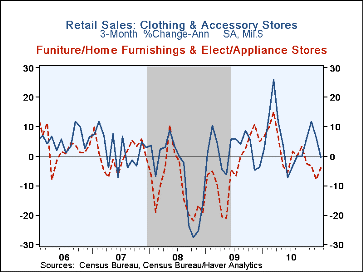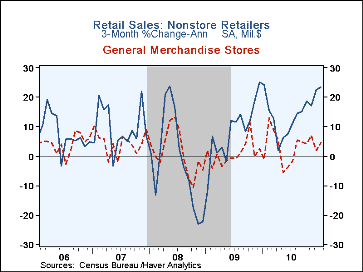 Global| Feb 15 2011
Global| Feb 15 2011U.S. Retail Sales Gain Disappoints
by:Tom Moeller
|in:Economy in Brief
Summary
January consumer spending lost forward momentum. Retail and food service sales rose 0.3% last month after a 0.5% December increase that was revised from 0.6%. Sales have risen for seven consecutive months; however, the latest was the [...]
January consumer spending lost forward momentum. Retail and food service sales rose 0.3% last month after a 0.5% December increase that was revised from 0.6%. Sales have risen for seven consecutive months; however, the latest was the weakest increase. Moreover, the rise disappointed Consensus expectations for a 0.5% gain, according to the Bloomberg survey. During the last three months, sales rose at a 6.7% annual rate versus a 6.5% increase during all of last year. Excluding autos, sales rose 0.3% last month, but the gain was half expectations. The gain equaled the December rise, earlier reported at 0.5%. During the last three months, nonauto sales rose at a 6.0% rate after the 5.8% increase last year.
Motor vehicle sales rose another 0.5% and roughly matched the gain in unit sales, reported earlier this month. In addition, higher gasoline prices pulled sales of gasoline service stations up 1.4% and at a 33.4% annual rate since October. Excluding sales of autos and gasoline, retail sales rose 0.3% in January and at a reduced 3.7% annual rate during the last three months.
Discretionary spending amongst other categories was weak, perhaps due to severe Winter weather. Building material sales were the weakest and posted a 2.9% decline (+8.7% y/y) last month. Sales at furniture & home furnishing stores slipped marginally (+0.3% y/y), the third decline in the last four months, and apparel sales fell 0.3% (+3.4% y/y) after a 1.4% December drop. Sales at electronics & appliance stores rose a modest 0.3% (-0.3% y/y) after declining during four of the prior five months. Sales at general merchandise stores rose 0.8% (3.1% y/y) and reversed a 0.9% December decline. Finally, bad weather discouraged eating out and food service sales fell 0.7% (+3.3% y/y).
Again, much retail shopping was done on-line. Sales of non-store retailers jumped 1.2% in January (13.5% y/y) following several monthly increases over 1.0%. Currently, sales by electronic shopping & mail-order houses account for roughly ten percent of nonauto retail sales less building materials & gasoline.
The retail sales figure are available in Haver's USECON database.
| Retail Spending (%) | Jan | Dec | Nov | Jan Y/Y | 2010 | 2009 | 2008 |
|---|---|---|---|---|---|---|---|
| Total Retail Sales & Food Services | 0.3 | 0.5 | 0.8 | 7.8 | 6.5 | -6.4 | -1.0 |
| Excluding Autos | 0.3 | 0.3 | 0.9 | 6.2 | 5.8 | -5.1 | 2.3 |
| Retail Sales | 0.5 | 0.6 | 0.8 | 8.3 | 7.0 | -7.1 | -1.4 |
| Motor Vehicle & Parts | 0.5 | 1.5 | 0.3 | 15.7 | 10.3 | -12.1 | -13.9 |
| Retail excluding Autos | 0.5 | 0.4 | 1.0 | 6.6 | 6.5 | -5.9 | 2.3 |
| Gasoline | 1.4 | 1.8 | 4.1 | 12.0 | 16.2 | -24.7 | 9.9 |
| Non-Auto Less Gasoline | 0.3 | 0.1 | 0.5 | 5.7 | 4.8 | -2.4 | 1.0 |
| Food Service | -0.7 | -0.2 | 0.0 | 3.3 | 2.9 | 0.5 | 2.4 |
Tom Moeller
AuthorMore in Author Profile »Prior to joining Haver Analytics in 2000, Mr. Moeller worked as the Economist at Chancellor Capital Management from 1985 to 1999. There, he developed comprehensive economic forecasts and interpreted economic data for equity and fixed income portfolio managers. Also at Chancellor, Mr. Moeller worked as an equity analyst and was responsible for researching and rating companies in the economically sensitive automobile and housing industries for investment in Chancellor’s equity portfolio. Prior to joining Chancellor, Mr. Moeller was an Economist at Citibank from 1979 to 1984. He also analyzed pricing behavior in the metals industry for the Council on Wage and Price Stability in Washington, D.C. In 1999, Mr. Moeller received the award for most accurate forecast from the Forecasters' Club of New York. From 1990 to 1992 he was President of the New York Association for Business Economists. Mr. Moeller earned an M.B.A. in Finance from Fordham University, where he graduated in 1987. He holds a Bachelor of Arts in Economics from George Washington University.
More Economy in Brief
 Global| Feb 05 2026
Global| Feb 05 2026Charts of the Week: Balanced Policy, Resilient Data and AI Narratives
by:Andrew Cates










